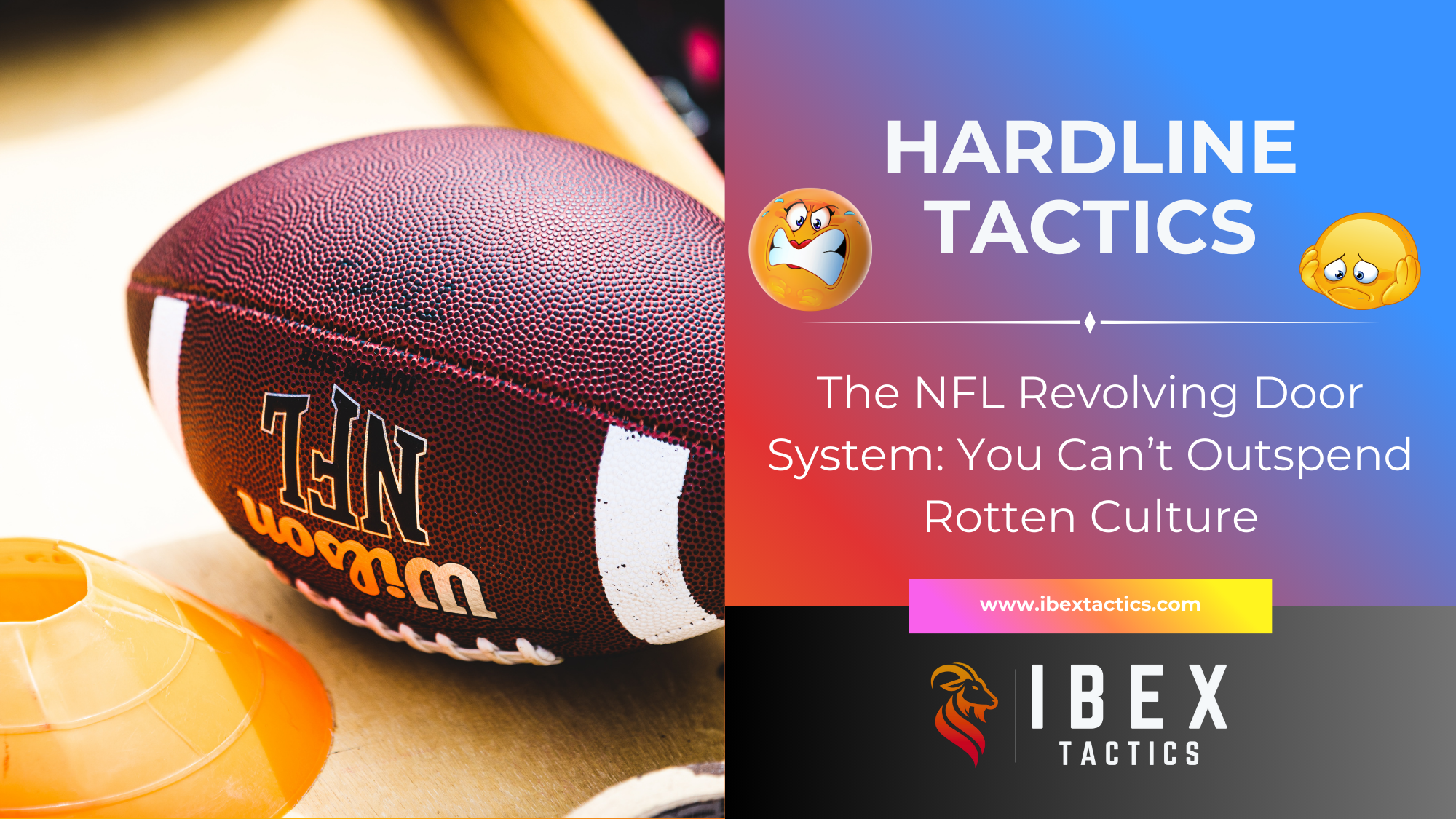The UCLA Paradox: A Winning Tradition, An Outdated Playbook
About Case Study Authors
Ibex Tactics LLC, was founded by Alex Bolowich & Ben Foodman. Before starting the company, Alex and Ben were working with athletes on an individual basis, helping them improve their mental performance using sport psychology-based interventions. While both professionals had incredible success working with some of the world’s most elite athletes, a significant portion of the time they were unable to help some of their clients due to the poor cultures these athletes were immersed in. As a result, Alex and Ben created Ibex Tactics LLC, which dedicated towards providing science-driven solutions to helping teams build resilient cultures.
TABLE OF CONTENTS
INTRODUCTION: UCLA Athletics & The Absence Of Alignment
PART I. How Losing Trust Harms Your Team’s Brand
PART II. UCLA Athletics’ Toxic Culture Of Firing Coaches
PART III. The University Of Tennessee & The Power Of Systems Thinking
PART IV. Do You Really Want To Be A Winner? Stop Using Conventional Thinking Models!
Introduction: UCLA Athletics & The Absence Of Alignment
Most of us can probably relate to this type of experience: Susan is friends with Sally. They hit it off great, they have so many common interests! They get to know each other for months and months and form what appears to be a fantastic friendship. But one day, out of the blue Sally completely throws Susan off her game. Sally became cold, unwelcoming, and even hostile! Susan was totally confused and tried to fix the situation, but Sally was having NONE OF IT! Sally had a COMPLETE MELTDOWN and told Susan to never call her again! Was it something Susan said? Maybe Susan forgot Sally’s birthday and didn’t acknowledge her the way Sally felt she needed to be. But upon reflection, Susan started to see that it wasn’t her fault, rather Sally was just showing us who she REALLY was all along…an unreliable friend. You see, at Ibex Tactics, in a weird way…that’s how we feel this week. We feel like we are Susan in this story, and UCLA is Sally!
You see, here is UCLA, beautiful, amazing UCLA! Fantastic facilities, winning traditions, constantly ranking as one of the top athletic departments in the Directors Cup, and then BOOM! They go ahead and fire their coach DeShaun Foster, a UCLA legend, kicking him back out into the cold, mean streets of the American professional sports coaching carrousel. "I regret putting Deshaun in that situation where we were going into the Big Ten and even though we were supported from a resource perspective, getting a start so late, really disadvantaged the beginning to his coaching career here," At Ibex Tactics, we have great empathy for the pressure that the AD and other members of the athletic department are under, but we noticed something unique about this story that we feel is an important lesson for all teams to learn from. This event highlights how athletic departments continue to use what we refer to as conventional thinking models, and we believe the next athletic department that recognizes this is going to start raking in the wins and money by switching over to utilizing more advanced systems! Let’s dive into why this is the case!
Part I. How Losing Trust Harms Your Team’s Brand
Ok, first, did you really analyze the quote we shared? Carefully read what the UCLA athletic director said here: I regret putting DeShaun in that situation where we were going into the Big Ten and even though we were supported from a resource perspective, getting a start so late, really disadvantaged the beginning to his coaching career here. So, here is how we are understanding this…the UCLA athletic department, regrets putting Coach Foster in a position to…coach the football team? Coaching at UCLA is being put in a bad position? You had all the resources, but it was still a disadvantage? When we first read this, we were a bit confused by the statement. Unfortunately, UCLA fans…it gets more confusing. The AD continues: The circumstances around this next search are very different than the last one. We're in a different situation. We have campus support and we're in the Big Ten, so this is a different picture this time. We're going to take our time with the search. It's an attractive job, it's not an easy job. ... I'm very confident in my ability to hire coaches to win championships. I've done it. Imagine for a moment you are a prospective coach looking to make a leap in your career. UCLA calls you and butters you up with everything the AD just said. Here is our question for you…how in the hell can you be sure the information you are getting from the athletic department is accurate?!
Why was the search not carefully plotted out when they hired coach Foster? Why would the coach now not be disadvantaged like coach Foster? How do you know if the athletic department is really all in on you? After all, that is literally what he said when he hired Coach Foster in 2024: Make no mistake – and I want to be clear with this – DeShaun Foster and this football program will get all the resources they need to be successful. We are all in on him and this program and going to the Big Ten. Look, we’re not trying to be mean and collect internet receipts! The truth is this may not actually even be the athletic director’s decision. We meet talented athletic directors that end up in difficult environments and never get to show the world how talented they are as leaders. UCLA’s AD may very well be immensely talented, but it’s becoming painfully obvious that UCLA’s problems are bigger than one person. In a recent report published in CBS sports by Shehan Jeyarajah, public records show that the entire athletic department has been in financial ruin which is the result of a lack of alignment on organizational strategy:
Over the past five years, public documents reveal that UCLA's athletic department has been in the midst of a financial mess. The department had deficits of more than $200 million over the period, many of which were exacerbated by the pandemic.
Frankly, the rough financial situation is a key part of the reason that the Bruins fled to the Big Ten in the first place. The new television contract pays out more than $30 million additional per year. That's only more important as the Bruins try to hit the $20.5 million revenue sharing number to simply continue playing major college athletics after the House case.
Let’s state the obvious…UCLA has a genuine crisis on its’ hands, and up to this point it has not instilled any trust in the public that they are capable of solving this problem. If we here at Ibex Tactics can casually see that, you better believe high quality coaching talent can too! These public missteps along with the data strongly suggests that UCLA will continue to use what we refer to as Conventional Thinking models and will most likely repeat the same mistakes they’ve made before. Let’s explore this on a deeper level.
Part II. UCLA Athletics’ Toxic Culture Of Firing Coaches
Here’s the deal, is it possible UCLA will make a splash hire this next go around? Sure! But every once in a while, a blind squirrel does find a nut! The nearly 20 years of data says that UCLA has a strong commitment to the “silver-bullet” strategy, meaning that they believe one coach will solve all of the problems UCLA faces in their football program, and that those problems will be solved VERY QUICKLY. Since 2002 to present, UCLA has hired 9 DIFFERENT coaches! That means that each coach has served an average of 2.5 years with the institution! Basically, if you go to UCLA you have 2.5 years to help a program reach championship level outcomes (their last claimed national championship in football was 1954)…for the record, it took Nick Saban more than 2.5 years to win national championships at LSU and Alabama. What’s more is that when you look at the philosophy of each of the coaches that UCLA hired, they are all completely different with how they ran their programs. People will make a counter argument and say that UCLA is making a strategic move in their hiring process to appease their fanbase. The idea is, we will hire someone completely different to show the fans that the athletic department is going in a different direction, which in theory will create a completely different emotional experience from the past coaching staff.
The problem is that when athletic departments do this, they are putting the cart before the horse. Your coach should not be creating the culture of your program by him or herself; it should already be established. UCLA’s athletic director is saying the quiet part out loud, which is that UCLA has no identity and does not know who they are as an organization. They are hoping someone from the outside can come in and provide the silver bullet solution which is a form of conventional thinking. We can’t believe we have to say this…but winners usually don’t apply conventional thinking in their pursuit of success. If we look at conventional thinking models, such as the ones proposed in David Peter Stroh’s, Systems Thinking for Social Change, UCLA appears to be positioning itself as a Conventional Thinking case study by using the silver bullet strategy:
The Connection Between Problems and their causes is obvious and easy to trace (e.g. we had the wrong, coach…let’s fire him/her, hire someone new)
Others, either within or outside our organization, are to blame for our problems and must be the ones to change (e.g. we had the wrong coach…let’s fire him/her, hire someone new)
A plicy designed to achieve short-term success will also assure long-term success (e.g. we had the wrong coach…let’s fire him/her, hire someone new)
in order to optimize the whole, we must optimize the parts (e.g. we had the wrong coach…let’s fire him/her, hire someone new)
aggressively tackle many independent initiatives simultaneously (e.g. we had the wrong coach…let’s fire him/her, hire someone new)
Winners utilize unconventional methods, or tactics that are different from their competitors. Most athletic departments don’t win national championships, yet for the most part they are all engaged in the same practices. This is the opportunity UCLA appears poised to miss, when in fact, they have a real chance to separate themselves from the rest of the competition by employing unconventional methods. One way they could do this, is by integrating systems thinking strategies to solve the dilemma they are in. Systems thinking would look more like the following:
The relationship between problems and their causes is indirect and not obvious
We unwittingly create our own problems and have significant control or influence in solving them through changing our behavior
Most quick fixes have unintended consequences: They make no difference or make matters worse in the long run
In order to optimize the whole, we must improve relationships among the parts
Only a few key coordinated changes sustained over time will produce large system change
Part III. The University Of Tennessee & The Power Of Systems Thinking
We always hear from the media and fans as to why a coach needs to be fired and replaced. Everyone thinks the next Nick Saban is right around the corner to save their program! But why is the media not asking harder questions about the athletic director’s role, or the board of trustees, or the chancellor, or the president? Look, we aren’t saying that these folks should be fired, and we are not saying that UCLA’s AD is to blame for this situation. What we are saying is that there were problems that preceded coach Foster, and instead of trying to “fix” UCLA football, we believe there needs to be a deeper, more thoughtful analysis of the situation. In fact, there is a similar case study that UCLA should study thoroughly…the University of Tennessee. After legendary Vols coach Philip Fulmer was fired, the Volunteers were left wandering the college football wilderness, chasing the silver bullet solution using conventional thinking models. What did they get for it? CHRONIC LOSING. So how did they get out of the rut? They addressed the cultural foundation using a systems thinking approach. Before they hired their current head coach, the university first made sweeping changes to their administrative lineup. In 2020, Randy Boyd was confirmed as UT’s president. Shortly around that time period, Dr. Donde Plowman was brought in as the Chancellor and was then followed by the hiring of athletic director Danny White. What do these leaders have in common? Alignment on utilizing a systems thinking approach!
Since these leaders began collaborating on the vision to restore UT athletics to its’ former glory, the results have spoken for themselves. Under White’s leadership, Tennessee Athletics has seen unprecedented success, culminating in the best overall year in its history in 2023-24. The fact of the matter is that utilizing Systems Thinking can have a HUGE PAYOFF, and the results below speak for themselves:
Tennessee was one of only two Power Five schools in 2024 to send every team to postseason last year — a first in UT history.
Tennessee finished third in the Learfield Directors’ Cup standings for the first time since the award began in 1993. Two of Tennessee’s three top 10 Directors’ Cup finishes have come under White’s watch.
Tennessee won its third straight SEC All-Sports Trophy, something that had never been done before White’s arrival.
Baseball won its first national championship under Head Coach Tony Vitello, the university’s first national championship of any kind since 2009.
The Tennessee Fund reported its third consecutive record year across multiple fundraising metrics in fiscal year 2024, closing the year on June 30 with a total of $139.7 million raised.
Part IV. Do You Really Want To Be A Winner? Stop Using Conventional Thinking Models!
Look, we are rooting for UCLA and their AD to succeed! We just don’t believe that firing people will solve the problem. Unfortunately, many athletic directors and college coaches we have spoken with consistently tell us about how they are always under pressure, and how there is a genuine lack of time to reach their KPIs. As such, this puts leaders in a position to find silver-bullet solutions using boring conventional thinking models. We want leaders to stop telling themselves that the next Nick Saban is right around the corner to save their program. Instead, we want them to become trend setters by using more advanced organizational psychology principles like systems thinking. In conclusion, we want to leave you with a closing thought on how leaders need to rethink their approach to solving obstacles preventing success within their organizations. In Peter Senge’s book, The Fifth Discipline, the author provides thoughtful insight as to how leaders should approach solving organizational obstacles:
Faster Is Slower - This, too, is an old story: the tortoise may be slower, but he wins the race. For most American Business people the best rate of growth is fast, faster, fastest. Yet, virtually all natural systems, from ecosystems to animals to organizations, have intrinsically optimal rates of growth. The optimal rate is far less than the fastest possible growth. When growth becomes excessive-as it does in cancer-the system itself will seek to compensate by slowing down; perhaps putting the organization’s survival at risk in the process.
If you are an organization that can relate to the struggles of UCLA and are looking for additional FREE resources to start making long-lasting changes to your team’s success, we recently unlocked our premier A-5 Assessment to help you see where your team needs to improve to reach its’ full potential!
NOTE TO READER:
Alex and Ben wanted to compile their expertise in the Ibex Tactics Case Studies to help teams in the sports and corporate sector better understand how many of the issues they are dealing with are more often than not related to culture. Most teams recognize that culture is an important component of their success, but do not always have the resources or expertise to analyze the complexity of culture. If you are interested in learning more about the services that Ibex Tactics offers to help with culture development, use the contact form below and sign up with your email to receive updates on new services and case studies!
Start your application today!
Are you looking for a way to enhance your organization’s performance outcomes? Are you curious to learn more strategies that can enhance your team culture? Use the form below to begin the application process to start the process of getting on our client list!
ARE YOU A PART OF THE HERD?!
Make sure you stay up to date on new case studies, services and relevant updates about Ibex Tactics! Don’t wait! Sign up below!

















